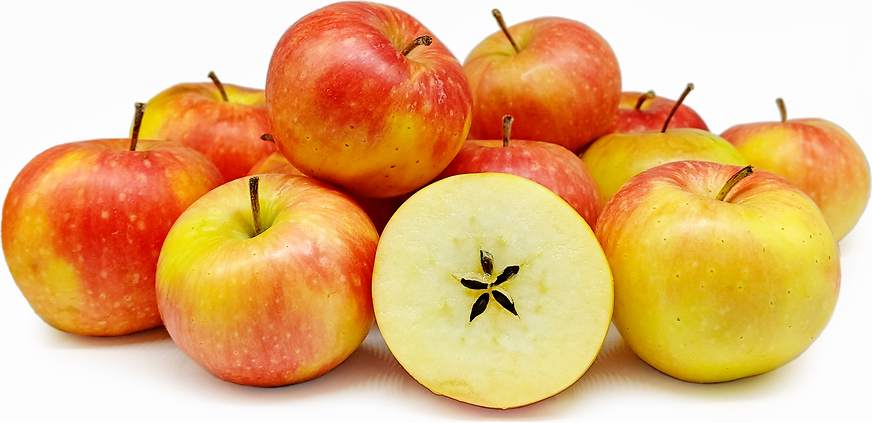


Dukat Apple
Estimated Inventory, lb : 0
Description/Taste
Dukat apples are somewhat uniform fruits with a round to oblate shape, connected to a slender and fibrous, dark brown stem. The skin is smooth and waxy with a golden yellow base, covered in bright red striping and blush. There are also many white spots and prominent lenticels scattered across the surface. Underneath the skin, the flesh is pale yellow to ivory, crisp, and dense, encasing a central core filled with small, black-brown seeds. Dukat apples are crunchy and juicy with a balanced, sweet and sour flavor.
Seasons/Availability
Dukat apples are harvested in the late fall and can be stored through the winter.
Current Facts
Dukat apples, botanically classified as Malus domestica, are a local Kazakh variety that belongs to the Rosaceae family. Also spelled Ducat, there is very little information written about the variety due to its localized use in Kazakhstan. Dukat apples are not listed in the database of the Kazakh Institute of Horticulture and Viticulture, and some experts believe that the apple’s name may have changed after the collapse of the USSR, eliminating any history or written records about the cultivar. Dukat apples are grown by select farmers and are resistant to disease with an average to high productivity depending on growing conditions. In Kazakhstan, the apples are seen as a local cultivar and are primarily consumed as a dessert variety, eaten fresh or dried.
Nutritional Value
Dukat apples are a good source of fiber, which can help regulate digestion and contain vitamin C, which is an antioxidant that can increase collagen production and boost the immune system. The apples also provide some magnesium, potassium, phosphorus, calcium, and folate.
Applications
Dukat apples are best suited for raw applications as their sweet-tart taste is showcased when consumed fresh, out-of-hand. The apples can be sliced and tossed into green and fruit salads, quartered and served on appetizers plates with nuts, cheeses, and other fruits, or consumed as a standalone snack. In addition to fresh applications, Dukat apples can be cooked into homemade fruit leather and are popularly dried for extended use throughout the winter season. Once thinly sliced and dried, the pieces can be eaten as is, or they can be soaked in water and cooked into fruit compotes. The sweet-flavored compotes can be drizzled onto ice cream, yogurt, oatmeal, pancakes, and French toast, or they can be used as a filling in baked goods. Dried Dukat apples can also be used to bake pies, muffins, and bread. In local folk remedies in Kazakhstan, the dried apple skin is steeped into a tea and drunk to reduce the severity of coughs. Dukat apples pair well with pears, cranberries, cherries, fennel, spices such as nutmeg, cinnamon, and clove, caramel, nuts such as almonds, pecans, and walnuts, and pumpkin. The fresh fruits will keep 1-2 months when stored in a cool, dry, and dark place such as the refrigerator.
Ethnic/Cultural Info
In Almaty, Kazakhstan, a unique stone pathway lined with apple trees known as “apple alley” was created in remembrance of academician Aimak Dzhangaliev. Constructed in April of 2019, the apple trees were planted by the Kazakh Institute of Horticulture and Viticulture as a tribute to the botanist on what would have been his 100th birthday. Dzhangaliev was considered to be the “father of apples” in Kazakhstan, having extensively researched and studied the sievers wild apple, and throughout his career, he developed over twenty-seven apple varieties. Many of the orchards found around Almaty today were planted by Dzhangaliev.
Geography/History
Dukat apples are a local variety native to Kazakhstan. While the exact origins of the variety are unknown, the apples are commonly grown in the Talgar district of Almaty oblast, which is an area famous for its fruit orchards since the early 20th century. Today Dukat apples are sold through local markets, and the Dukat apples featured in the photograph above were found at a weekend food fair in Almaty, Kazakhstan.




